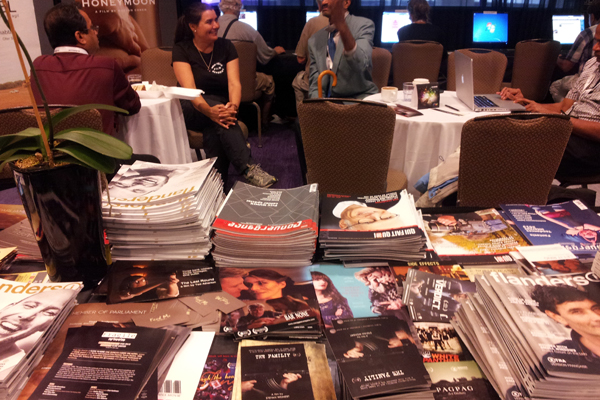

The first time I noticed a Canadian film was in 2004 when"The Barbarian Invasions," directed by Denys Arcand, won the Best Foreign Language Oscar. Specifically there was one detail that caught my attention: A character in the movie, a middle-aged man, was dating a young Chinese woman and, being a social democrat, he burst into a eulogy for China's"cultural revolution" (1966-76). The woman quietly retorted that the revolution purged her parent (I forgot it's her father or mother, but it could more likely be her father) and took his life away. For her family as well as for millions in China, this revolution was not an idealist's social experiment, it was a catastrophe for the whole nation leaving a painful scar.
 |
|
Film promotional materials at the 37th Montreal World Film Festival. Photo?/Raymond Zhou |
That little detail impressed me as it touches on an aspect rarely tackled in a commercial film, i.e. the true mentality of an intellectual in a Western country. Of course the whole movie may resonate more with those who live in the West than with a typical Chinese whose only exposure to Western culture is through books and movies.
Later on, I checked out Denys Arcand's"The Decline of the American Empire," which precedes the Oscar winner in story line, and"Jesus of Montreal." Honestly, these movies do not easily endear themselves to a Chinese filmgoer, even a film devotee. They contain cultural elements that require familiarity with the Quebecois environment, especially the literati scene in Montreal. Yet they hold a strange allure that goes beyond mere comprehension. They have a mystique that may be explained by the fusion of European culture and North American culture in a creatively vibrant place like Montreal.
In the recent decade, as many as six Canadian films were nominated for the Academy Awards in the Best Foreign Language Film category or made into the 9-film shortlist. I cannot claim to have seen all of them, but of those I have, I have failed to detect a running theme or style. That testifies to the rich diversity of French-Canadian cinema."It could be the tip of the iceberg," I told myself and tried to seize every opportunity to catch as many Canadian movies as possible during my visits to the Montreal World Film Festival. Henry Welsh, communications director for the festival, in a way confirmed my suspicion when he told me:"Those that got into the Oscar race may not necessarily be the best Canadian film of the year, but they were all good films."
“War Witch," nominated for the Oscar in 2013, looks like an African movie, with not a trace of Canada in the plot."Inch'Allah," which I saw at the Beijing International Film Festival and is screened at a special section for the Montreal festival called"Our cinema – Review of a year of hits," sets the story in the Middle East though with the perspective of a Canadian outsider.
 |
|
The market room is always crowded with people on the lookout for great movies or a great deal in the film business.Photo/Rayond Zhou |
I realized how inclusive Canadian cinema is when I discovered that Fan Lixin's documentary feature"Last Train Home," chronicling three years of a Chinese migrant family but funded with Canadian money, won the best documentary award at the Jutra Award, which is mostly for Francophone movies.
For most film enthusiasts, the top names of quintessential Canadian cinema is Atom Egoyan and David Cronenberg, whose works are known to quite a few Chinese. But the best-known Canadian film could well be Francois Girard's"The Red Violin," which is globe-trotting in plot but takes place in Shanghai and Montreal for the last two legs of the violin's arduous journey through time and space.
For my taste, Girard's other music-themed movie"Thirty-Two Short Films About Glenn Gould" is a much better film. It is inventive in structure and totally fascinating. Besides, it is a biopic of a Canadian cultural icon.
While doing research for this journal, I stumbled upon a list of"Top 10 Canadian Films of All Time," which is compiled once every ten years by the Toronto International Film Festival. The list has been done three times so far, and every time the top movie is"Mon oncle Antoine" (“My uncle Antoine"), a 1971 film, and the second or third entry is"Goin' Down the Road" from 1970. That means, I've still got a lot of catching up to do.
Related:
Raymond Zhou: Montreal Journal, August 29
Raymond Zhou: Montreal Journal, August 28
Raymond Zhou: Montreal Journal, August 27
Raymond Zhou: Montreal Journal, August 26
Raymond Zhou: Montreal Journal, August 25
Raymond Zhou: Montreal Journal, August 24
Raymond Zhou: Montreal Journal, August 23